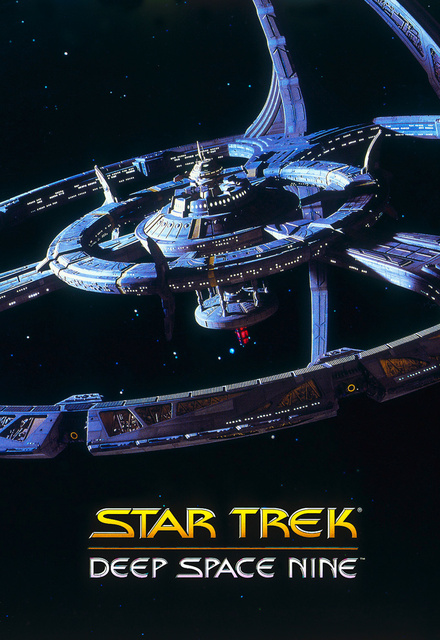
Deep Space Nine. Well, I certainly feel like I’m in deep something, because this is where binge-watching all things Star Trek becomes more work than fun. Beginning during The Next Generation’s 6th Season, Deep Space Nine is on a parallel timeline with the stories of the Enterprise for its first two seasons. If you’re watching Star Trek in the order the episodes first aired (like I’m doing, for some reason), then this marks the point where you begin zig-zagging between TV shows, first between The Next Generation and Deep Space Nine, and later between Deep Space Nine and Voyager, with the occasional movie thrown in in case all that sounded too easy. 1993-1999 is the most congested era for “Trekkies” by far.
Commander Benjamin Sisko (Avery Brooks) is given command of the space station Deep Space Nine (no starship on this show, at least until Season 3). Sisko’s wife was killed three years earlier by the Borg, under the command of Locutus (a.k.a. the then-assimilated Captain Picard). Spun off almost directly from The Next Generation, this show features Chief O’Brien (Colm Meaney) in a new position, and, starting from Season 4, none other than Lieutenant Commander Worf (Michael Dorn) joins the cast. Unlike previous Star Trek shows and movies, this crew’s adventures are mostly localized within the city-sized space station, resulting in more serialized storytelling than ever before and a darker tone than fans may be used to. But once the Dominion War starts, the show really (or finally) finds its footing.
Deep Space Nine takes quite a bit of time to find itself, with its characters displaying no charisma whatsoever in the beginning seasons. They’re self-absorbed, dislike one another for no apparent reason, and behave very callously rather than attempt to build some kind of professional rapport. It’s a far cry from the family dynamic of the previous two shows. I’ll admit: I very strongly considered quitting this show in its first season. But I toughed it out, often painfully, and was happily rewarded with what is arguably the deepest and most mature Star Trek series ever produced. If you’re looking for traditional good-guy vs. bad-guy plots, those could be hard to come by in the later seasons. Gray areas are a massive part of Deep Space Nine’s appeal. A villain could be an honest philanthropist with actual good intentions who’s just misguided enough that they’re slowly causing real harm, and a hero could be someone who’s forced to do something absolutely monstrous in order to stop something that’s even worse. It may be significantly less “fun” than Star Trek fans are used to, but it stands on its own brilliantly and shows that life in space is anything but easy.
This show is also known for adopting elements Gene Roddenberry never wanted for his vision of the future. Things like money, religion, and xenophobia play big parts on Deep Space Nine. It could be that this show was (or wasn’t; nothing’s been proven) ripped off from the proposed idea for Babylon 5, which Paramount Television rejected only to come out with a strikingly similar show that Babylon 5 now had to compete with in the ratings. But regardless of its origin, Deep Space Nine remains a spin-off of The Next Generation, and expands the Star Trek universe in powerful ways. It focuses far more on drama than action. Characters grow and change on a nearly episodic basis. Points of no return are par for the course here, leaving predictability in the dust. This is easily the least Star Treky show out of all of them. And trust me: that’s a very, very, very good thing!
With one of the most unpleasant first seasons in recent memory, Deep Space Nine nevertheless became far more than just The Next Generation: Part 2. It surpassed my expectations in every conceivable way, from writing, to directing, to acting (although Avery Brooks’ acting remained melodramatically stilted throughout, resulting in my least favorite captain so far). I proudly held my beer up to the TV screen during the very dignified final moments in the series finale. Spin-off, rip-off, or otherwise, this is TV done right. Its identity is solid, and may even be my favorite of all the Star Trek TV series. It’s science-fiction with a high I.Q., and like all great TV shows, even after 7 seasons, it leaves you wanting more.
4 out of 5
